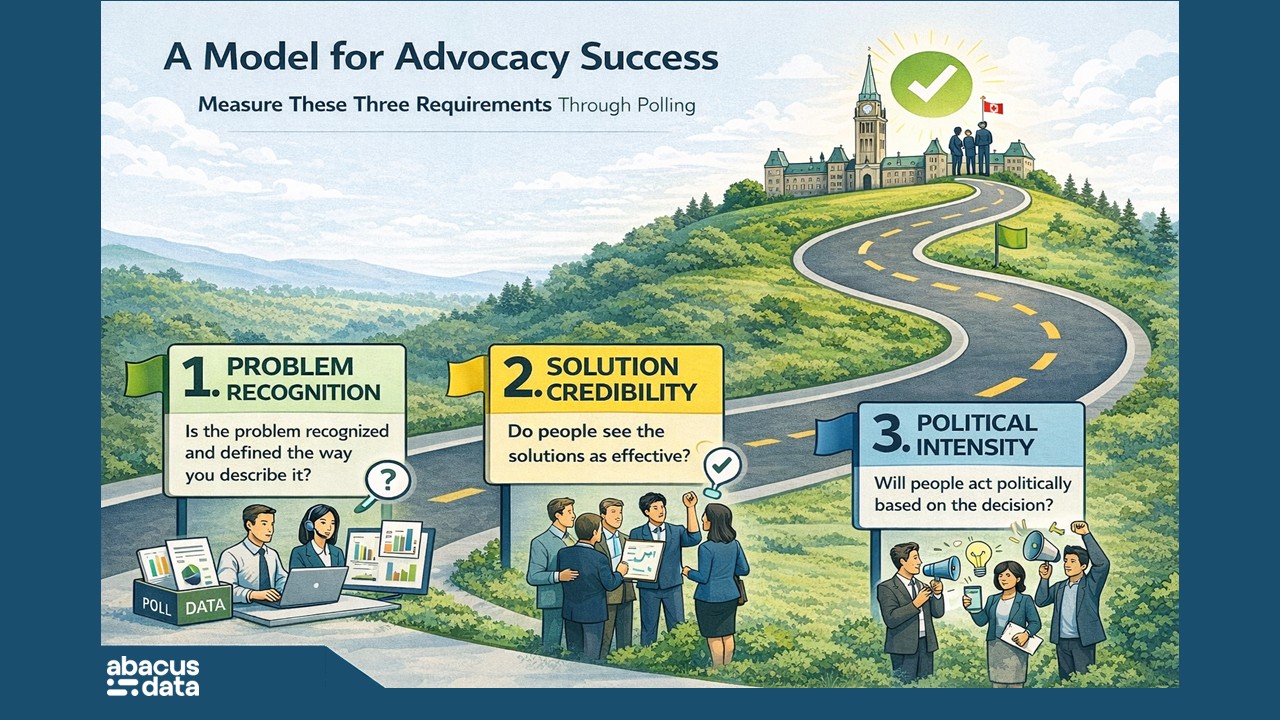Abacus Data Poll: What Canadians Want in a Prime Minister and Who’s Delivering on It
July 27, 2025
New Abacus Data research reveals Canadians have clear expectations for their leaders and Mark Carney currently aligns more closely with those expectations than Pierre Poilievre.
In a moment defined more by uncertainty than upheaval, Canadians are not just evaluating what their leaders promise to do, they’re watching closely for how they lead. What kind of leadership do Canadians want right now? What traits are considered essential for the job of Prime Minister? And how well our main national political leaders – Mark Carney and Pierre Poilievre – living up to that standard?
That’s the question this research set out to answer.
Rather than focusing on policy or partisanship, we asked Canadians to step back and consider leadership more fundamentally: what qualities matter most in a Prime Minister? And once those expectations are established, how well do they describe the current Prime Minister and the man who hopes to replace him someday?
The data tell a compelling story. Canadians have a clear and widely shared view of what they want in a leader: calm under pressure, principled over partisan, thoughtful, strategic, and in touch with ordinary people. When measured against these expectations, Mark Carney significantly outperforms Pierre Poilievre on nearly every dimension. The contrast is especially striking among accessible voters – those open to voting Liberal or Conservative but don’t currently support those parties – who see Carney as better aligned with the leadership qualities they value most.
What follows is a detailed look at what leadership looks like to Canadians in the moment we are and how well the two main political figures in the country measure up.
The Nine “Must-Have” Leadership Qualities
We presented Canadians with a list of nine traits and behaviours and asked how important each is in selecting a Prime Minister. The result: a broad consensus on what Canadians expect in a leader.
- Three-quarters (74%) say a Prime Minister must put the country’s interests ahead of political gain.
- 72% say they must understand the challenges facing ordinary Canadians.
- 71% want someone who has a clear strategy and plan.
- 68% expect open and clear communication about goals.
- 67% prioritize evidence-based decision making over ideological rigidity.
- Traits like being calm and steady during uncertain times (65%), providing thoughtful answers (63%), and being willing to change one’s mind (59%) are also seen as must-haves.
- Even traits that may feel like political style points, such as avoiding unnecessary conflict, are deemed essential by a majority (56%).

What’s notable is that these are not qualities easily written off as partisan. Liberal and Conservative voters alike rate them highly, with only small gaps between the two camps. This tells us that, for most voters, the bar is set high, and not particularly differently across the political spectrum.

Carney Closer to the Mark
Across all nine of the qualities tested, more Canadians believe Mark Carney embodies these traits than Pierre Poilievre. The gaps are not just statistical; they are substantial and consistent.
For example:
69% say Carney is “calm and steady during uncertain times”, the highest score on any attribute. Just 45% say the same about Poilievre.
On avoiding unnecessary conflict, Carney leads Poilievre by 16 points.
On providing thoughtful answers and communicating clearly, he leads by 13 and 5 points respectively.

Even on the top “must-have” item, putting the country’s interests ahead of political gain, Carney is seven points ahead (55% vs. 48%).
Carney’s biggest advantage shows up when we isolate “accessible” voters for the Liberal and Conservative parties – those who don’t currently support the party but say they might consider voting for it. Among these swing voters:
79% say Carney is calm and steady, compared to just 48% for Poilievre.On thoughtfulness and avoiding unnecessary conflict, the gaps are +18 and +20 in Carney’s favour.
Even on items like changing one’s mind when presented with better evidence, a rare trait in modern politics, Carney has a 7-point edge.

In short, Carney is not just liked. He’s seen as competent, principled, and measured, qualities that resonate strongly with the electorate right now.
Poilievre’s Challenge: A Growing Gap Between Expectations and Perception
For Pierre Poilievre, the picture is more complicated. While his supporters see him in highly positive terms, and his ratings are strong within the Conservative voter universe, his alignment with broader public expectations is weaker.

Among all Canadians, there’s a double-digit gap between what people want and what they believe Poilievre offers on almost every attribute:
- A 26-point gap on putting the country ahead of politics (7-point larger gap than Carney)
- A 20-point shortfall on making decisions based on evidence (9-point larger gap than Carney)
- 15- to 18-point deficits on being calm, having a plan, and communicating clearly.
To be clear, this doesn’t mean Canadians dislike him – since 55% say he understands ordinary Canadians, 54% say he communicates clearly, and earlier analysis finds his net favourable is -4 at the moment.. But those numbers simply aren’t high enough to match the public’s expectations vis-à-vis Mark Carney.

The result: a leader with a solid, motivated base, but one who faces clear resistance from other voters, especially those looking for calm, substance, and non-combative leadership.
What About Carney’s Gaps?
Carney’s numbers aren’t perfect either. Among all Canadians, there are still gaps between expectations and perception on several items. The largest:
- 19-point gap on putting the country ahead of politics.
- 17 points on understanding ordinary Canadians.
- 15 points on having a plan.
But these gaps are smaller than Poilievre’s, and in many cases, they’re closed or reversed among key groups. Among 2025 Liberal voters, for instance, Carney overperforms expectations on eight of the nine tested traits. And among accessible Liberal voters, he performs particularly well, including:
- 79% say he’s calm and steady.
- 77% say he avoids conflict.
- 70% say he communicates clearly.

The Qualities That Matter Most Right Now
Not all traits matter equally. When we look at what Canadians are telling us, three “must-have” qualities consistently sit at the top of the list:
- Putting country over politics (74%)
- Understanding ordinary Canadians (72%)
- Having a clear strategy (71%)
These three speak to a moment where voters are tired of gamesmanship, hungry for authenticity, and eager for competence. The current context, post-pandemic fatigue, Trump 2.0, micro-economic anxiety, extreme weather, and international instability, has pushed people to look for leaders who are serious, grounded, and credible.

Traits like “calm during uncertain times” and “decisions based on evidence” round out the top five, reinforcing the picture of an electorate seeking steadiness, not spectacle. Reassurance over disruption.
In this environment, Mark Carney is better positioned. He delivers more of what voters say they want. And he does so not just with his base, but with those still up for grabs.
More Advanced Analysis
If the analysis above didn’t provide enough evidence, then the following should. When we use binary logistic regression to understand which of the nine elements are the most important in predicting positive impressions of both Mark Carney and Pierre Poilievre.
Mark Carney
The analysis for Mark Carney reveals that three attributes are especially predictive of a favourable impression of him.
Calm and steady during uncertain times (Estimate: 1.03, p < 0.001)
This is the strongest predictor. Canadians who believe Carney embodies this trait are significantly more likely to view him favourably. In a moment shaped by volatility and uncertainty, this calmness appears to be a core leadership signal.
Puts the country ahead of party (Estimate: 0.90, p < 0.001)
This quality, ranked as the most essential by Canadians, is also a strong driver of Carney’s appeal. It reinforces the importance of perceived integrity and national focus in shaping political impressions.
Makes decisions based on evidence, not ideology (Estimate: 0.88, p < 0.001)
Competence and rationality matter. Carney’s technocratic brand appears to align well with voter preferences for evidence-based, pragmatic leadership.
Other statistically significant predictors include thoughtful communication, a clear plan, and a willingness to avoid unnecessary conflict. Traits like “changing one’s mind” or “understanding ordinary Canadians” are directionally positive but fall short of statistical significance at the 95% confidence level.
Pierre Poilievre
We ran a separate binary logistic regression to determine which leadership traits best predict positive impressions of Pierre Poilievre.
The most powerful predictor for Poilievre is “puts the country’s interests ahead of political gain” (Estimate: 1.46, p < 0.001). Canadians who perceive this quality in him are far more likely to view him favourably, reinforcing the central role this attribute plays across political lines. However, while the trait matters a great deal, fewer voters assign it to Poilievre compared to Carney, making it both a key opportunity and a vulnerability.
Two other traits also stand out as significant predictors of positive impressions:
- “Provides thoughtful answers, not just talking points” (Estimate: 0.80, p = 0.005)
This suggests that when Poilievre is seen as substantive and thoughtful, rather than reactive or rehearsed, his appeal broadens considerably. - “Understands the challenges facing ordinary Canadians” (Estimate: 0.62, p = 0.009)
This aligns with one of Poilievre’s brand strengths, his repeated focus on affordability, housing, and everyday struggles. When this connection lands, it drives favourability.
Three additional traits, having a strategy, clear communication, and avoiding conflict, are also statistically significant and positively associated with favourable views. However, the magnitude of these effects is smaller.
Interestingly, “being calm during uncertain times” and “making decisions based on evidence, not ideology” are not significant predictors in this model. This may reflect a brand built more on urgency, conviction, and contrast than on calmness or technocratic pragmatism.
One trait, “avoids unnecessary conflict”, is negatively associated with favourable impressions of Poilievre (Estimate: -0.70, p = 0.04), meaning that those who perceive him as not combative are less likely to view him positively suggesting those who like him, appreciate the friction he creates. They likely want more, not less – even as most Canadians would prefer a leader who doesn’t do that.
Insight from the Advanced Models
When we compare the two models side by side, a clear pattern emerges: while both Mark Carney and Pierre Poilievre benefit from being seen as leaders who put the country ahead of political gain, the drivers of favourable impressions diverge beyond that.
For Carney, favourability is most strongly linked to perceptions of calmness, evidence-based decision-making, and measured, principled leadership, traits that reflect a technocratic, steady approach.
In contrast, Poilievre’s support is driven more by being seen as thoughtful, in touch with ordinary Canadians, and clear in his communication, although his more confrontational style may be limiting his broader appeal despite it being a driver of favourability to those who like him. In short, Canadians reward both men for seriousness and purpose, but Carney wins with reassurance and steadiness, while Poilievre’s strength comes from connection and conviction.

So What?
In a tight race where the Conservative and Liberal parties are statistically neck-and-neck, the question of leadership character could play a defining role. Voters aren’t just asking who has the better policy, they’re asking who they trust to steer the country through a moment defined by volatility, high stakes diplomacy, and shifting economic terrain.
Pierre Poilievre’s strength continues to lie in mobilizing his base and speaking to a sense of urgency and dissatisfaction. But the data here reveal the limits of that strategy: his brand is not yet aligned with the broader public’s expectations of a Prime Minister. And his more confrontational political style, while appealing to core supporters, may be holding him back among those who value calm, collaboration, and institutional trust.
Mark Carney, on the other hand, benefits from being perceived as measured and policy-driven. His perceived temperament matches what more Canadians are looking for right now, especially as his government navigates complex negotiations with the United States and continues to respond to global trade turbulence stirred up by Donald Trump.
Canadians are not vague or passive about what they want in a leader. They want someone who puts the country first, understands their challenges, and brings a clear, steady hand. Right now, Mark Carney is meeting those expectations better than Pierre Poilievre, not just with his own base, but with the people in the middle who will decide future elections.
These numbers reinforce the challenge Poilievre faces in broadening his appeal. He’s not far off in raw vote numbers, but he trails on the stuff that defines prime ministerial leadership in the minds of most Canadians. That doesn’t mean the gap can’t close, but it may require a recalibration of tone and substance or a change in the competitive landscape (a rising NDP and BQ).
As Canadians enter the second half of 2025, most are not demanding radical reinvention. They’re asking for stability, empathy, and competence. The question isn’t just whether voters are satisfied with government performance at this point; it’s whether they see a leader who matches the moment.
Carney’s calm, technocratic style fits well with a public mood that prizes steadiness over spectacle. For Poilievre, the challenge isn’t enthusiasm, it’s expansion. Unless he can reshape how Canadians see him on the traits they value most, the path to victory will depend less on how frustrated people are with the status quo, and more on whether they believe the alternative is truly ready to lead.
Methodology
The survey was conducted with 1,915 Canadian adults from July 10 to 15, 2025. A random sample of panelists were invited to complete the survey via partner panels based on the Lucid exchange platform.
The margin of error for a comparable probability-based random sample of the same size is +/- 2.2%, 19 times out of 20.
The data were weighted according to census data to ensure that the sample matched Canada’s population according to age, gender, and region. Totals may not add up to 100 due to rounding.
The survey was paid for by Abacus Data.
Abacus Data follows the CRIC Public Opinion Research Standards and Disclosure Requirements that can be found here: https://canadianresearchinsightscouncil.ca/standards/

ABOUT ABACUS DATA
We are Canada’s most sought-after, influential, and impactful polling and market research firm. We are hired by many of North America’s most respected and influential brands and organizations.
We use the latest technology, sound science, and deep experience to generate top-flight research-based advice to our clients. We offer global research capacity with a strong focus on customer service, attention to detail, and exceptional value.
And we are growing throughout all parts of Canada and the United States and have capacity for new clients who want high quality research insights with enlightened hospitality.
Our record speaks for itself: we were one of the most accurate pollsters conducting research during the 2025 Canadian election following up on our outstanding record in the 2021, 2019, 2015, and 2011 federal elections.
Contact us with any questions.
Find out more about how we can help your organization by downloading our corporate profile and service offering.




